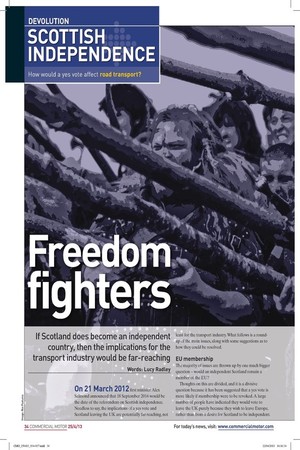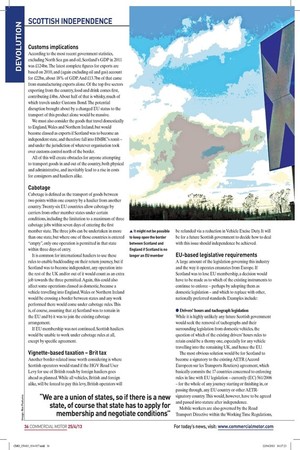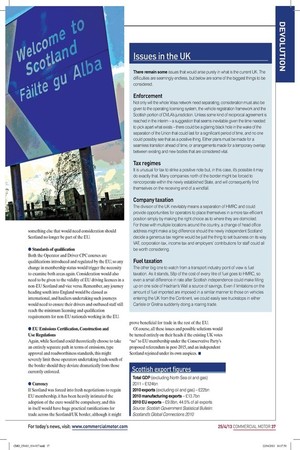If Scotland does become an independent country, then the implications
Page 25

Page 26

Page 27

Page 28

If you've noticed an error in this article please click here to report it so we can fix it.
for the transport industry would be far-reaching Words: Lucy Radley On 21 March 2012 first minister Alex Salmond announced that 18 September 2014 would be the date of the referendum on Scottish independence. Needless to say, the implications of a yes vote and Scotland leaving the UK are potentially far-reaching, not least for the transport industry. What follows is a roundup of the main issues, along with some suggestions as to how they could be resolved.
EU membership The majority of issues are thrown up by one much bigger question — would an independent Scotland remain a member of the EU?
Thoughts on this are divided, and it is a divisive question because it has been suggested that a yes vote is more likely if membership were to be revoked. A large number of people have indicated they would vote to leave the UK purely because they wish to leave Europe, rather than from a desire for Scotland to be independent. EU Commission president Jose Manuel Ban-oso told a BBC interview: "We are a union of states, so if there is a new state, of course that state has to apply for membership and negotiate conditions."
This was later confirmed in a letter released by the Lords Economic Affairs Committee on 10 December 2012, after the Scottish National Party claimed the statement to be part of a "fabricated story".
Separate membership might well result in Scotland losing some of the UK's current opt-outs in Europe, most notably from Euro membership and the Schengen Agreement — a treaty allowing for cross-border movement under a single visa in the Schengen Area it created. The ramifications of all this are huge for the transport industry, as even domestic movements could be affected. Below is a list of issues we believe are relevant.
Border controls While it was initially assumed the border between Scotland and England would remain open as it is now, this might not be possible if either Scotland is no longer an EU member, or it is forced to join Schengen as part of its conditions of membership.
Leaving aside the structural and practical implications of this for the population at large, several specific questions concerning the freight industry in particular are thrown up. Customs implications According to the most recent government statistics, excluding North Sea gas and oil, Scotland's GDP in 2011 was £124bn. The latest complete figures for exports are based on 2010, and (again excluding oil and gas) account for £22bn, about 18% of GDP. And £13.7bn of that came from manufacturing exports alone. Of the top five sectors exporting from the country, food and drink comes first, contributing £4bn. About half of that is whisky, much of which travels under Customs Bond. The potential disruption brought about by a changed EU status to the transport of this product alone would be massive.
We must also consider the goods that travel domestically to England, Wales and Northern Ireland, but would become classed as exports if Scotland was to become an independent state, and therefore fall into HMRC's remit — and under the jurisdiction of whatever organisation took over customs control north of the border.
All of this will create obstacles for anyone attempting to transport goods in and out of the country, both physical and administrative, and inevitably lead to a rise in costs for consignors and hauliers alike.
Cabotage Cabotage is defined as the transport of goods between two points within one country by a haulier from another country. Twenty-six EU countries allow cabotage by carriers from other member states under certain conditions, including the limitation to a maximum of three cabotage jobs within seven days of entering the first member state. The three jobs can be undertaken in more than one state, but where one of those countries is entered "empty", only one operation is permitted in that state within three days of entry.
It is common for international hauliers to use these rules to enable backloading on their return journey, but if Scotland was to become independent, any operation into the rest of the UK and/or out of it would count as an extra job towards the three permitted. Again, this could also affect some operations classed as domestic, because a vehicle travelling into England, Wales or Northern Ireland would be crossing a border between states and any work performed there would come under cabotage rules. This is, of course, assuming that a) Scotland was to remain in the EU and b) it was to join the existing cabotage arrangement.
If EU membership was not continued, Scottish hauliers would be unable to work under cabotage rules at all, except by specific agreement.
Vignette-based taxation Brit tax Another border-related issue worth considering is where Scottish operators would stand if the HGV Road User Levy for use of British roads by foreign hauliers goes ahead as planned. While all vehicles, British and foreign alike, will be forced to pay this levy, British operators will be refunded via a reduction in Vehicle Excise Duty. It will be for a future Scottish government to decide how to deal with this issue should independence be achieved.
EU-based legislative requirements A large amount of the legislation governing this industry and the way it operates emanates from Europe. If Scotland was to lose EU membership, a decision would have to be made as to which of the existing instruments to continue to enforce — perhaps by adopting them as domestic legislation — and which to replace with other, nationally preferred standards. Examples include: • Drivers' hours and tachograph legislation While it is highly unlikely any future Scottish government would seek the removal of tachographs and their surrounding legislation from domestic vehicles, the question of which of the existing drivers' hours rules to retain could be a thorny one, especially for any vehicle travelling into the remaining UK, and hence the EU.
The most obvious solution would be for Scotland to become a signatory to the existing AETR (Accord Europeen sur les Transports Routiers) agreement, which basically commits the 17 countries concerned to enforcing rules in line with EU legislation — currently (EC) 561/2006 — for the whole of any journey starting or finishing in, or passing through, any EU country or other AETRsignatory country. This would, however, have to be agreed and passed into statute after independence.
Mobile workers are also governed by the Road Transport Directive within the Working Time Regulations, something else that would need consideration should Scotland no longer be part of the EU.
• Standards of qualification Both the Operator and Driver CPC courses are qualifications introduced and regulated by the EU, so any change in membership status would trigger the necessity to examine both areas again. Consideration would also need to be given to the validity of EU driving licences in a non-EU Scotland and vice versa. Remember, any journey heading south into England would be classed as international, and hauliers undertaking such journeys would need to ensure their drivers and outbased staff still reach the minimum licensing and qualification requirements for non-EU nationals working in the EU.
• EU Emissions Certification, Construction and Use Regulations Again, while Scotland could theoretically choose to take an entirely separate path in terms of emissions, type approval and roadworthiness standards, this might severely limit those operators undertaking loads south of the border should they deviate dramatically from those currently enforced.
• Currency If Scotland was forced into fresh negotiations to regain EU membership, it has been heavily intimated the adoption of the euro would be compulsory, and this in itself would have huge practical ramifications for trade across the Scotland/UK border, although it might prove beneficial for trade in the rest of the EU.
Of course, all these issues and possible solutions would be turned entirely on their heads if the existing UK votes "no" to EU membership under the Conservative Party's proposed referendum in post-2015, and an independent Scotland rejoined under its own auspices. • Issues in the UK There remain some issues that would arise purely in what is the current UK. The difficulties are seemingly endless, but below are some of the biggest things to be considered.
Enforcement Not only will the whole Vosa network need separating, consideration must also be given to the operating licensing system, the vehicle registration framework and the Scottish portion of DVLA's jurisdiction. Unless some kind of reciprocal agreement is reached in the interim —a suggestion that seems inevitable given the time needed to pick apart what exists —there could be a glaring black hole in the wake of the separation of the Union that could last for a significant period of time, and no one could possibly see that as a positive thing. Either plans must be made for a seamless transition ahead of time, or arrangements made for a temporary overlap between existing and new bodies that are considered vital.
Tax regimes It is unusual for tax to strike a positive note but, in this case, it's possible it may do exactly that. Many companies north of the border might be forced to reincorporate within the newly established State, and will consequently find themselves on the receiving end of a windfall.
Company taxation The division of the UK inevitably means a separation of HMRC and could provide opportunities for operators to place themselves in a more tax-efficient position simply by making the right choice as to where they are domiciled. For those with multiple locations around the country, a change of head office address might make a big difference should the newly independent Scotland decide a generous tax regime would be just the thing to set business on its way. VAT, corporation tax, income tax and employers' contributions for staff could all be worth considering.
Fuel taxation The other big one to watch from a transport industry point of view is fuel taxation. As it stands, 58p of the cost of every litre of fuel goes to HMRC, so even a small difference in rate after Scottish independence could make filling up on one side of Hadrian's Wall a source of savings. Even if limitations on the amount of fuel imported are imposed in a similar manner to those on vehicles entering the UK from the Continent, we could easily see truckstops in either Carlisle or Gretna suddenly doing a roaring trade.







































